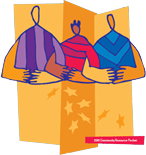 The United States Department of Health and Human Services released the 2004 report indicating, approximately 872,000 children were found to be victims of child abuse or neglect during the year 2004. The good news is that between 2001 and 2004, the rate of victimization has decreased, from 12.5 per 1,000 children in 2001 to 11.9 per 1,000 children in 2004. These are significant decreases since 1993, when reports indicated the rate of abused and neglected children reached a high of 15.3 per 1,000 children.
The United States Department of Health and Human Services released the 2004 report indicating, approximately 872,000 children were found to be victims of child abuse or neglect during the year 2004. The good news is that between 2001 and 2004, the rate of victimization has decreased, from 12.5 per 1,000 children in 2001 to 11.9 per 1,000 children in 2004. These are significant decreases since 1993, when reports indicated the rate of abused and neglected children reached a high of 15.3 per 1,000 children.
The reports show the number of children victimized by abuse or neglect have decreased, and the number of cases investigated have also increased. During 2001, the rate of investigation was 43.2 children per 1,000; during 2004 this investigations increased to 47.8 children per 1,000. During 2004 investigations of child abuse and or neglect were substantiated for about 30 percent of the cases.
The report indicates of the children who were found to be abused and/or neglected in 2004:
- 62.4 percent experienced neglect.
- 17.5 percent were physically abused.
- 9.7 percent suffered sexual abuse.
- 7.0 percent were emotionally or psychologically abused.
- 2.1 percent suffered medical neglect.
The reports estimate 1,490 children died due to abuse or neglect in 2004, with over 80 percent being under the age of 4-years old.
Nineteen percent of victims were placed in foster care.
 The release of the full report, Child Maltreatment 2004, is timed to coincide with the start of Child Abuse Prevention Month 2006. The statistics found in the report are based on information collected through the National Child Abuse and Neglect Data System. Child Maltreatment 2004 is available on the Children’s Bureau Website.
The release of the full report, Child Maltreatment 2004, is timed to coincide with the start of Child Abuse Prevention Month 2006. The statistics found in the report are based on information collected through the National Child Abuse and Neglect Data System. Child Maltreatment 2004 is available on the Children’s Bureau Website.
Communities can help parents reduce the risk of child abuse and neglect by providing family supports, according to this year’s theme for Child Abuse Prevention Month: Safe Children and Healthy Families Are a Shared Responsibility.
Photo credit for this blog entry:  (no use restrictions for this photo)
(no use restrictions for this photo)
![]() Special Needs and Adoption-Related Terms:
Special Needs and Adoption-Related Terms:
A | B | C | D | E-F | G-H-I | J-K-L | M | N-O | P | Q-R | S | T-U-V-W-X-Y-Z
For more information about parenting special needs children you might want to visit the Families.com Special Needs Blog and the Mental Health Blog. Or visit my personal website.

